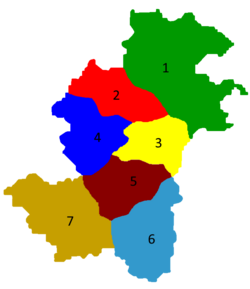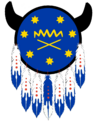The Meoquanee
The Meoquanee
ᎠᏥᏏ ᏍᎦᏯᏓ Great Meoquanee Nation | |
|---|---|
Tribal Confederation | |
|
| |
 | |
| Confederated | 1794 |
| Government | |
| • Type | Tribal Council |
| • High Chieftain | Tecumseh |
| • Council | Council of Seven Fires |
| Population (2018) | |
| • Total | 505,021 |
| Demonym | Meoquanee |
| Time zone | UTC−06:00 (CST) |
| • Summer (DST) | UTC−05:00 (CDT) |
The Meoquanee (Meoquanee:ᎠᏥᏏ ᏍᎦᏯᏓ'''), also known as the Great Meoquanee Nation, is a a multi-tribal confederation comprising Native and First Nations peoples who share a common linguistic and cultural heritage known as Meoquanee. The Meoquanee Nation is governed by a Grand Council referred to as the Council of Seven Fires which is composed of representatives from each of the member tribes. the Confederation is organized into matrilineal clans, which are family groups based on the maternal line of descent. In this, chiefs can be removed from their positions by the women of the tribe.
Etymology
Meoquanee (ᎠᏥᏏ ᏍᎦᏯᏓ) is the by which the Seven Nations refer to themselves.
History
Tribal Groups
Despite its name, the Meoquanee Nation actually consists of seven distinct nations, each characterized by its own cultural traditions and governance systems.
Nations
| English name | Meoquanee name | Meaning |
|---|---|---|
| Nasawi | ᎾᏣᏫ | "People of the Heart" |
| Wyanwa | ᏪᎾᏩ | "People of the Brotherhood" |
| Kathanti | ᎧᏚᏔᏂ' | "People of Giving Thanks" |
| Aelamet | ᎠᏆᎳᎺᏝ | "People of Love" |
| Nahara | ᎾᎲᎳ | "People of Friendship" |
| Ashwaki | ᎠᏍᏫᎧᎢ | "People of the Fish" |
| Dohute | ᏙᎲᏖ | "People of the Butterfly" |
Clans
Within these nations, individuals are affiliated with various matrilineal clans, which are familial groups organized according to maternal lineage. The number of clans within each nation currently ranges from three to eight, totaling nine unique clan names across the Confederation. These clans serve as essential social and cultural units, providing members with a sense of identity and belonging while preserving ancestral connections and traditions.

